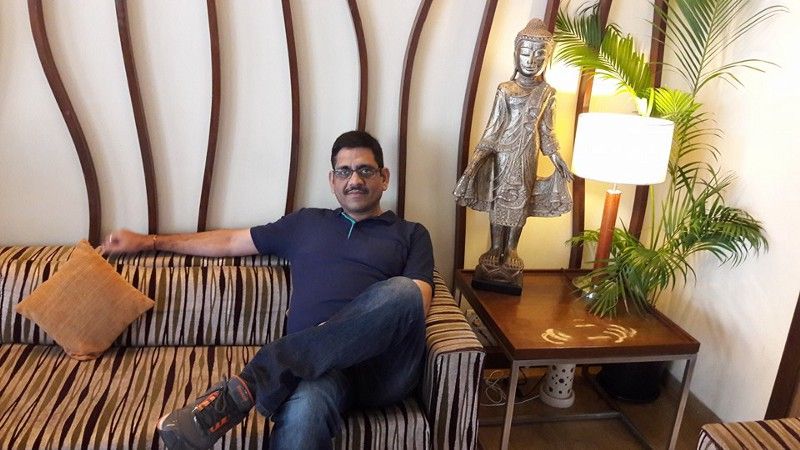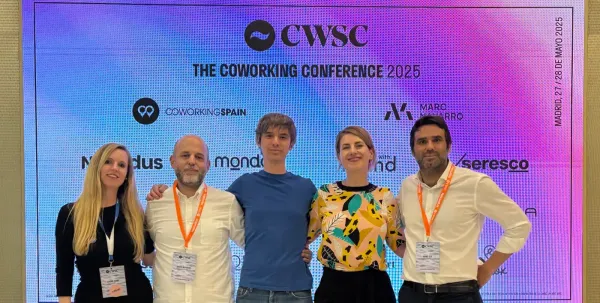Thanks for tuning into our new series #CoworkingIndia2019, focusing on the innovation and excellence coming out of the flexible workspace environment of India. With over 1.3 billion inhabitants and an entrepreneurial spirit, India is already at the forefront of the changing world of office space. Cobot is highlighting some of the achievements and faces of this frontier of collaborative and flexible spaces as we prepare for CU Asia 2019.
Thanks for taking the time to chat with us! Can you tell us a bit about yourself?
My name is Ashwin Agrawal, I had been associated with leading IT education & training companies for around two decades before deciding to quit for good.
I am now associated with two technology start-ups, one in the field of robotics R&D titled Phi Robotics, through which we take up industrial projects in the space of automation and allied domains. The next company, Phi Education, is an offshoot of the former, it promotes project based and applied learning primarily for the undergraduate engineering pursuing students in the areas of embedded systems, computer vision, image processing, control systems & product design, IoT, and machine learning, to name a few. Phi Education has a portal which is being used as a teaching-learning platform by academia. After successful alliances with the higher education academia, we are making forays into the K12 segment with our innovative STEM learning solutions. I head business and operations for Phi Education.
How did you get into coworking?
Prior to getting associated with The Daftar as a co-worker/community member in and around Dec 2016, I had taken up a private cabin space in a conventional business centre in the vicinity. After having been associated with giant corporate IT conglomerates, the feeling of operating out of a cabin was no different, except that I didn’t have fellow colleagues around. Until this moment in time I was not acquainted with the concept of coworking!
In hindsight, it was fortunate that the business centre wound up its operations. I googled for alternatives and chanced upon The Daftar and another similar entity. I filled in the enquiry forms of both. Only one of them responded the same night. It was the community manager of The Daftar, her voice filled with excitement and earnestness to have me as a part of their community. She had preemptive responses to all my questions, so much so that I was barely left with any question to ask. As the result of that, I’ve been here for the past two years.
Visiting the next day and taking a walk through the space was more of a formality. However, while there, I came across bunches of smart young people with nerdy looks, more like college dropouts all set to change the world with their innovative start-up ideas. For a moment I felt I may be a mismatch in this culture (gauge my age from my pic), but then the community manager came to my rescue again. I decided to take a plunge into the world of coworking.
Can you tell us a bit about your experience working at The Daftar?
I remember that the initial few months working out of The Daftar was a painfully new experience. There was a lack of privacy and chaos seemed to prevail everywhere. I would consider other co-workers as individual entities. There was no common thread binding us, or so I thought. Gradually the meaning and essence of co-working started dawning upon me. A method in the madness started emerging. I realized that people from different domains and areas of specialization actually form a collective whole, living by the true spirit of co-working. This proved to be true to the core, when my wife recently hosted a workshop on arts and painting for amateurs and professional artists. It didn’t take long for us to decide upon The Daftar to be the venue. The designer co-workers helped us with the artworks, the digital marketing team helped us with reaching out and publicising the event on social media platforms, and the result: a successful event.
If you had to choose, which amenities do you think are most important to you and which are less important?
Most important:
- Basic housekeeping, cleanliness of public utilities
- Seamless and high speed internet connectivity
- Comfortable fixtures and furnitures
Least important:
- Exotica of fixtures and furnitures
- Exotica of interiors
Have you worked out of other spaces in India? In the world? If so, what have you noticed in terms of similarities and differences?
As shared earlier, I have worked out of other spaces in India. But they were closer to a business centre, in which the owner was more interested in selling a seat, and had no vision of building a community of like minded members, belonging to diverse fields. I think this is a major difference between a coworking and a business centre culture.
What would you tell someone who doesn’t understand why you don’t work in a traditional office?
I find traditional offices to be enclosure traps, a guarded fort of sorts. This is more so, after having been associated with the corporate world for over twenty years. A coworking space with fresh & young people coming and going at their will, with no straps e.g. id-cards around their necks, and taking naps on bean bags when they feel like is a pleasing view, is a welcome difference from a traditional office. People are accountable only to themselves.
Saving costs is one more aspect of a coworking space which prompts me to utilize it.
Thank you for sitting down to talk with us! Is there anything else you’d like to share?
Just that the team of The Daftar is a vibrant, young and passionate young team. They are striving hard each moment to live up their dreams of building an ever expanding community of like-minded people.
Cobot helps coworking businesses around the world to effectively manage their spaces. You’ll find that our features can help you run your coworking space more efficiently and grow a healthy, and happy, community. Want to try it out to see how Cobot can help you automate your daily administrative tasks? Just sign up for a free trial or a live demo session and reach out to our support to learn about our available discounts.



